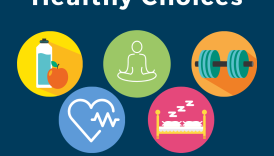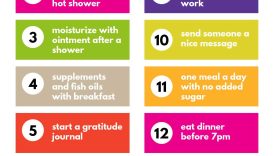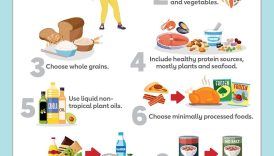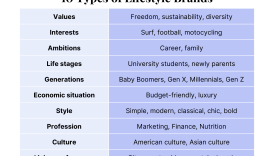Nutrition Tips for Fueling an Active Lifestyle

The journey towards an active lifestyle is not solely about exercising; it starts with understanding the foundational role nutrition plays in fueling performance and recovery. The right balance of nutrients can make a significant difference in how individuals feel, perform, and recover from their workouts. Imagine waking up, ready to tackle a hike, and feeling energized and alive due to the wholesome meals you’ve prepared the day before. Here are a few reasons why nutrition is pivotal:
- Nutrition Tips for Fueling an Active Lifestyle
- Importance of Nutrition for Active Lifestyle
- Macronutrients for Energy
- Micronutrients for Recovery
- Pre-Workout Nutrition
- Hydration Strategies
- Meal Timing
- Post-Workout Nutrition
- Protein-Rich Foods
- Carbohydrates for Glycogen Replenishment
- Snacking Tips for Sustained Energy
- Choosing the Right Snacks
- Snacking Time Management
- Meal Planning for Active Individuals
- Balanced Diet Components
- Portion Control
- Supplements for Active Lifestyle
- Common Supplements to Consider
- Consulting with Professionals
- Hydration Recommendations for Athletes
- Daily Hydration Goals
- Hydration During Exercise
- Importance of Rest and Recovery
- Sleep Quality
- Muscle Repair and Growth
- Mindful Eating Practices
- Techniques for Mindful Eating
- Creating a Mindful Eating Environment
- Healthy Snack Ideas for On-the-Go
- Quick and Nutritious Snack Options
- Portable Snack Ideas**
- XII. Fueling Strategies for Endurance Performance
- Pre-Event Nutrition
- During the Event
- XIII. Nutrition Tips for Strength Training
- Pre-Workout Nutrition
- Post-Workout Recovery**
- XIV. Managing Cravings and Emotional Eating
- Understanding Cravings**
- Strategies to Combat Emotional Eating**
- XV. Conclusion
- Key Takeaways**
- Optimizes energy levels
- Enhances performance
- Aids recovery
As we delve deeper into nutrition strategies for active lifestyles, we’ll uncover essential components that anyone can implement to improve their health and effectiveness in physical activities.
Importance of Nutrition for Active Lifestyle
Focusing on nutrition is essential for anyone leading an active lifestyle, as it provides the energy needed to sustain physical effort and supports recovery afterward. Proper nutrition is not just about keeping fit; it’s about thriving in everyday activities.
Macronutrients for Energy
Macronutrients—carbohydrates, proteins, and fats—fuel the body and ensure peak performance. For instance, athletes often rely on carbohydrates for energy during workouts. A personal favorite is a banana before a run; it provides a quick energy boost! Here’s how macronutrients contribute:
- Carbohydrates: Primary energy source.
- Proteins: Support muscle repair.
- Fats: Provide long-lasting energy.
Micronutrients for Recovery
While macronutrients are critical for energy, micronutrients—vitamins and minerals—are just as vital for recovery. They help replenish your body after strenuous activities. For example, magnesium-rich foods like spinach can soothe muscles post-exercise. Key micronutrients to focus on include:
- Vitamin C: Boosts immune health and aids in collagen formation.
- Electrolytes (sodium, potassium): Maintains fluid balance and prevents cramps.
Incorporating these nutrients into your diet can lead to more energized workouts and quicker recovery times. Eating smart supports not just the body but also the active lifestyle you aim for!
Pre-Workout Nutrition
Just as important as what you eat after a workout is what you consume beforehand. Pre-workout nutrition can set the tone for your performance, making it essential to pay attention to both hydration and meal timing.
Hydration Strategies
Staying hydrated is key, especially if you’re engaging in intense physical activity. A personal anecdote: before my half-marathon training, I learned that drinking enough water boosts my stamina. Here are hydration strategies to consider:
- Drink water throughout the day to maintain optimal hydration levels.
- Electrolyte drinks can be helpful, especially before longer workouts to replace lost minerals.
- Monitor urine color—a light yellow indicates good hydration.
Meal Timing
When it comes to eating before exercising, timing is crucial. Eating too close to your workout can lead to discomfort, while eating too early may leave you feeling sluggish.
- Aim for a balanced meal 2-3 hours before exercising, including carbs and protein.
- If short on time, a light snack 30-60 minutes before, like yogurt with fruit or a granola bar, can help.
Combining proper hydration and meal timing not only enhances performance but also promotes a more enjoyable workout experience. Get it right, and you’ll feel the difference!
Post-Workout Nutrition
After an intense workout, your body goes into recovery mode, and what you eat during this crucial period can significantly impact your results. Post-workout nutrition is all about replenishing lost nutrients to repair and rebuild muscle while restoring energy levels.
Protein-Rich Foods
Protein is vital for muscle recovery, and incorporating protein-rich foods shortly after exercise helps initiate the rebuilding process. For instance, after a rigorous weightlifting session, I enjoy a homemade protein shake with whey protein, banana, and almond milk. Here are some excellent protein options to consider:
- Chicken breast: Lean and versatile.
- Greek yogurt: Creamy and packed with protein.
- Eggs: Quick to prepare and nutrient-rich.
Carbohydrates for Glycogen Replenishment
In addition to protein, carbohydrates are essential for replenishing glycogen stores that fuel your workouts. For example, after a long bike ride, I opt for a bowl of oatmeal topped with berries, as it satisfies both my hunger and energy needs. Good carbohydrate sources include:
- Whole grain bread: Great for sandwiches.
- Quinoa: A protein-packed grain.
- Fruits: Naturally sweet and easy to digest.
Eating the right balance of protein and carbohydrates post-workout not only aids in effective recovery but also prepares you for your next workout, setting the stage for ongoing success!
Snacking Tips for Sustained Energy
Maintaining sustained energy levels throughout the day is vital for achieving optimal performance, especially for those with active lifestyles. Snacking wisely can bridge the gap between meals and keep you fueled.
Choosing the Right Snacks
Selecting snacks that combine the right nutrients can help avoid energy crashes. Personally, I keep a stash of almonds and dried fruit in my bag for a quick energy boost during busy days. Here are some go-to options that work wonders:
- Nut butter and whole-grain crackers: A blend of healthy fats and carbs.
- Greek yogurt with honey and seeds: Protein-packed and satisfying.
- Vegetables and hummus: Rich in fiber with a satisfying crunch.
Snacking Time Management
Timing is crucial for effective snacking. Here are some tips:
- Aim for a snack every 2-3 hours to maintain energy levels.
- Be mindful of portion sizes to avoid overeating.
- Plan ahead by preparing snacks in advance, saving precious time and energy during the week.
By integrating smart snacking habits into your routine, you’ll find it easier to sustain energy levels and stay ready for any challenge that comes your way!
Meal Planning for Active Individuals
Effective meal planning is essential for active individuals, not only to optimize performance but also to enhance overall well-being. Taking the time to plan meals helps ensure that the right nutrients are consumed consistently, which can make a noticeable difference in energy levels and recovery.
Balanced Diet Components
A balanced diet is vital for fueling an active lifestyle. Personal experience taught me the importance of variety; I started including a wider array of food groups to support my fitness goals. Here are the key components to focus on:
- Carbohydrates: Whole grains, fruits, and vegetables for energy.
- Proteins: Lean meats, legumes, and dairy for muscle support.
- Healthy Fats: Nuts, seeds, and avocados for sustained energy.
Portion Control
While including a variety of foods is important, portion control is equally vital in ensuring you’re not overeating. Balancing servings can be challenging but here’s how to manage it effectively:
- Use smaller plates and bowls to help control portion sizes.
- Practice mindful eating—pay attention to hunger cues and eat slowly.
- Consider following the plate method: Fill half your plate with vegetables, a quarter with lean protein, and the other quarter with whole grains.
By thoughtfully planning meals and practicing portion control, active individuals can better sustain their energy, improve performance, and create healthier eating habits.
Supplements for Active Lifestyle
While a balanced diet is foundational for an active lifestyle, supplements can play a valuable supporting role in optimizing performance and recovery. During my fitness journey, I’ve found that the right supplements can fill nutritional gaps and provide an extra boost when needed.
Common Supplements to Consider
When incorporating supplements, it’s essential to choose wisely based on individual needs. Here are some popular options that many active individuals find beneficial:
- Protein Powder: A convenient way to meet protein requirements, particularly post-workout.
- Creatine: Often used to enhance strength and muscle gains.
- Branched-Chain Amino Acids (BCAAs): Helpful for reducing muscle soreness and promoting recovery.
Consulting with Professionals
Before starting any supplements, it’s wise to consult with a healthcare professional or a dietitian. Personalizing your supplement plan can make a significant difference in achieving your fitness goals. They can help determine:
- What you specifically need based on your activity level.
- Optimal dosages for safety and effectiveness.
Overall, while supplements can enhance an active lifestyle, they should complement a well-rounded diet, not replace it. Balancing both can help you reach your full potential!
Hydration Recommendations for Athletes
Staying properly hydrated is essential for athletes, as even mild dehydration can lead to decreased performance and increased fatigue. Based on my own experiences during training, I learned that paying attention to hydration can often be the difference between a great workout and a mediocre one.
Daily Hydration Goals
A good starting point is to aim for about half your body weight in ounces of water each day. For instance, if you weigh 150 pounds, aim for around 75 ounces of water daily. Here are some tips:
- Monitor urine color: Light yellow indicates good hydration.
- Set reminders: Use your phone or hydration apps to prompt regular water intake.
Hydration During Exercise
During workouts, particularly those lasting longer than an hour, it’s important to replenish lost fluids. Here’s how to do that effectively:
- Drink about 7-10 ounces of water or sports drink every 10-20 minutes during intense workouts.
- Choose electrolyte drinks for longer sessions to replace lost minerals, especially in hot weather.
By focusing on hydration before, during, and after exercise, athletes can enhance their performance and recovery significantly, ensuring they’re always ready to tackle their next challenge!
Importance of Rest and Recovery
After focusing on hydration, it’s crucial to consider the equally important aspects of rest and recovery for anyone following an active lifestyle. Proper recovery not only refreshes both the body and mind but also plays a vital role in overall performance enhancement. From my own experience, I’ve found that prioritizing recovery has significantly improved my exercise results.
Sleep Quality
Quality sleep is a cornerstone of effective recovery. Sleep allows the body to heal and rejuvenate, so it’s crucial to aim for 7-9 hours per night. Here are some tips to enhance sleep quality:
- Establish a sleep routine: Go to bed and wake up at the same time each day.
- Limit screen time: Reduce exposure to devices at least an hour before bed to help your body relax.
- Create a calming environment: Dark, cool, and quiet spaces promote deeper sleep.
Muscle Repair and Growth
During rest, the body undergoes muscle repair and growth, essential for those engaged in physical training. Protein intake post-workout provides the necessary building blocks for repair. Key tips include:
- Consume protein-rich meals within 30-60 minutes post-exercise to kickstart recovery.
- Include rest days in your training regimen to prevent overuse injuries.
By emphasizing proper rest—including quality sleep and muscle recovery—everyone can maximize their performance and pave the way for long-term success in fitness endeavors.
Mindful Eating Practices
Transitioning from the importance of rest and recovery, it’s equally beneficial to incorporate mindful eating practices into your routine. Practicing mindfulness can transform the way we approach food, helping to enhance enjoyment and improve digestion. Personally, I noticed that by slowing down during meal times, I not only savor my food more but often consume less.
Techniques for Mindful Eating
To get started with mindful eating, consider these techniques:
- Eat without distractions: Turn off the TV and put away your phone to focus on your meal.
- Savor each bite: Take the time to truly enjoy the flavors and textures of your food.
- Listen to your body: Pay attention to hunger cues and eat until satisfied, not stuffed.
Creating a Mindful Eating Environment
A conducive environment can further enhance mindful eating:
- Set the table nicely: A pleasant setting can make meals feel special.
- Practice gratitude: Before eating, take a moment to appreciate the food on your plate.
Incorporating mindful eating practices can lead to healthier choices, better digestion, and an overall improved relationship with food, creating a harmonious balance for those living an active lifestyle.
Healthy Snack Ideas for On-the-Go
Building on the concept of mindful eating, finding healthy snacks that can be enjoyed on-the-go is essential for anyone leading an active lifestyle. Personally, as someone constantly on the move, I’ve discovered that having nutritious snacks ready can keep my energy levels steady while also satisfying hunger.
Quick and Nutritious Snack Options
Here are some of my favorite on-the-go snacks that are both healthy and convenient:
- Nut Butter Packs with Apple Slices: Easy to pack; they provide a great combination of healthy fats and fiber.
- Trail Mix: A mix of nuts, seeds, and dried fruit is perfect for a quick energy boost.
- Homemade Energy Bites: Rolled oats, honey, peanut butter, and mini chocolate chips make a delightful, energy-dense snack.
Portable Snack Ideas**
To take it a step further, consider these portable options:
- Greek Yogurt Cups: High in protein and great for any time of day.
- Rice Cakes with Avocado: Spread avocado on rice cakes for a light and filling snack.
- Vegetable Sticks: Carrot and cucumber sticks paired with hummus are refreshing and crunchy.
By keeping these healthy snack options on hand, you can fuel your body effectively, maintain energy levels, and enjoy delicious food no matter how busy your day gets!
XII. Fueling Strategies for Endurance Performance
Continuing from the importance of healthy snacks, let’s delve deeper into fueling strategies specifically tailored for endurance performance. When it comes to activities like long-distance running or cycling, the right nutrition can make a significant difference in energy levels and overall performance. My own experiences have shown that planning meals and snacks plays a crucial role in achieving those long-lasting energy reserves.
Pre-Event Nutrition
Before an endurance event, consuming the right foods is key to setting yourself up for success. Aim for:
- Carbohydrate-rich meals 2-3 hours prior, such as oatmeal or whole grain pasta.
- Consider a light snack 30-60 minutes beforehand, like a banana or an energy bar for quick fuel.
During the Event
During prolonged activities, it’s essential to keep energy levels steady:
- Consume energy gels or chews every 30-45 minutes for quick carbohydrates.
- Stay hydrated with electrolyte drinks or water, which replenish lost fluids and key minerals.
By implementing these fueling strategies for endurance performance, athletes can sustain energy levels, improve their endurance, and ultimately reach their goals more effectively!
XIII. Nutrition Tips for Strength Training
Building on the fueling strategies for endurance performance, it’s important to shift our focus to nutrition specifically tailored for strength training. Proper nutrition plays a crucial role in maximizing muscle gain and recovery during weightlifting sessions. From my experience in strength training, I’ve found that nutrition can significantly impact performance in the gym.
Pre-Workout Nutrition
Before hitting the weights, it’s vital to fuel your body effectively:
- Carbohydrate and protein combo: Think oatmeal with protein powder or whole grain toast with nut butter.
- Timing matters: Aim to eat a balanced meal 2-3 hours before your workout, or a smaller snack 30-60 minutes prior for optimal energy.
Post-Workout Recovery**
After a strength training session, your body needs nutrients to recover properly:
- Protein intake is vital: Aim for 20-30 grams of protein post-workout, which can be achieved through options like grilled chicken, Greek yogurt, or a protein shake.
- Replenish with carbs: Pair your protein with a source of carbohydrates, like a banana or sweet potato, to restore glycogen stores.
By incorporating these nutrition tips for strength training into your routine, you can enhance muscle growth, recovery, and overall strength outcomes!
XIV. Managing Cravings and Emotional Eating
Following the nutrition tips for strength training, it’s essential to address an often-overlooked aspect of healthy eating: managing cravings and emotional eating. Many people experience moments where emotions drive food choices rather than genuine hunger, which can hinder fitness goals. I’ve found that acknowledging these cravings and developing strategies to cope can lead to healthier habits.
Understanding Cravings**
Recognizing the root cause of cravings is the first step in managing them. Common triggers include:
- Stress or anxiety: Turning to food for comfort.
- Boredom: Eating out of habit rather than hunger.
- Hormonal changes: Fluctuations can increase appetite.
Strategies to Combat Emotional Eating**
Here are some effective strategies I’ve employed to navigate cravings:
- Find healthier alternatives: Swap ice cream for frozen yogurt or fruit when craving sweets.
- Practice mindfulness: Take a moment to breathe and assess whether you’re genuinely hungry or seeking comfort.
- Stay hydrated: Sometimes thirst is mistaken for hunger; keep a water bottle handy.
By understanding cravings and implementing these strategies, individuals can effectively manage emotional eating, making healthier choices that align with their fitness and wellness goals.
XV. Conclusion
Transitioning from managing cravings and emotional eating, we’ve explored a comprehensive approach to nutrition that supports an active lifestyle. Prioritizing proper nutrition, hydration, and recovery are foundational elements for anyone looking to enhance their performance and overall well-being. Personally, integrating these practices has transformed my fitness journey, allowing me to feel more energized and focused.
Key Takeaways**
As we wrap up, here are some crucial points to remember:
- Fuel your body with the right nutrients: Balance macronutrients and micronutrients for optimal performance.
- Stay hydrated: Proper hydration is essential for energy and recovery.
- Practice mindful eating: Recognize hunger cues and enjoy your food to foster a healthier relationship with eating.
By applying these principles, you can embark on a successful journey towards achieving your fitness goals while maintaining your health and happiness. Remember, it’s not just about the destination but also about enjoying the journey!





